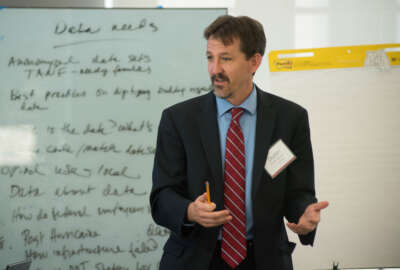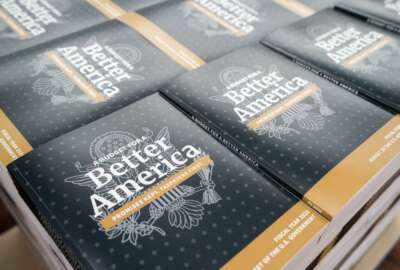
Government, universities launch regional ‘hubs’ to build stronger talent pipeline
In effort to build a better talent pipeline and foster more collaborative, working relationships between government and universities, the Volcker Alliance has...
Best listening experience is on Chrome, Firefox or Safari. Subscribe to Federal Drive’s daily audio interviews on Apple Podcasts or PodcastOne.
It’s no secret by now: the federal government has a talent pipeline problem.
Just 6-to-7 percent of federal employees are under the age of 30. Nearly 30 percent of the federal workforce will be eligible to retire in the next five years.
But here’s another statistic that should scare agency leaders and federal managers.
The number of new hires of student interns to federal agencies has dropped from 35,000 in 2010 to 4,000 in 2018, according to the most recent budget request from the White House. The Trump administration attributed agencies’ reactions to regulatory changes in student programs as the reason behind the new-hire nosedive.
The state of the current talent pipeline from colleges and universities is what’s prompting the Volcker Alliance, in partnership with the Office of Personnel Management and Office of Management and Budget, to launch a network of “government-to-university” regional councils across the country.
Each council will serve as a “marketplace” to bring together federal, state and local government agencies and colleges and universities. The goal is to build a stronger talent pipeline from academia into government careers — and set a shared research agenda between the two entities.
The alliance will add two G2U councils in Kansas City, Missouri, and Austin, Texas, later this spring. It plans to add more councils in other regions this fall.
The Trump administration said it sees the G2U councils as an opportunity to more systematically communicate and partner with academia, which has been a challenge in the past.
“A lot of this really is about connecting supply and demand, whether that’s on the recruitment front or the research front,” Dustin Brown, a deputy assistant director at the Office of Management and Budget, said the Volcker Alliance’s launch event Wednesday morning in Washington. “At the federal level there’s this saying of ‘posting and praying’ for jobs. Thinking even about the procurement process, we have rather informal relationships with a lot of partnerships through a competitive selection process. A lot of the most productive, longstanding relationships are ones that have built trust over time.”
A group of leaders from the Federal Executive Boards across the country watched the alliance’s launch event from its training conference in Chicago.
The FEBS served as a valuable asset when the Volcker Alliance launched the Government-to-University initiative last fall, Tom Ross, the alliance’s president, said.
Brown led the alliance’s initial discussions with colleges and universities when he took a six-month sabbatical from OMB last fall. He traveled to Carnegie Mellon University, the University of North Carolina-Chapel Hill, the University of Kansas and the University of Texas-Austin to host discussions with students, faculty and administrators, as well as members of local, state and federal government agencies in those regions.
The Volcker Alliance said it wants to see the G2U initiative play a role in placing more college graduates in government careers. It wants to see a greater interest from students about the prospect of public service.
University administrators see a similar opportunity.
“My vision would be that the public sector comes to the university first when they’re thinking about their problems, and the university goes to the public sector first when they’re thinking about some of the research that they’re doing,” said Angela Evans, dean of the Lyndon B. Johnson School of Public Affairs at the University of Texas-Austin. “The way you do that is through this kind of consortium.”
The prospect of sharing research agendas with academia is also promising to the Trump administration — especially under strict internal controls and grants management guidelines and chaotic budget cycles.
“How do I get the capital into that mission in a way that is inspiring to academics to do the research that breaks things open differently?” Margaret Weichert, OMB’s deputy director for management and acting director of the Office of Personnel Management, said. “That is part of how we are thinking in government. We need to bring the power of good-government, academia and the government itself together to solve problems.
Weichert said the Government Effectiveness Advanced Research (GEAR) Center will soon launch a competition with seed funding to find research proposals and pilot programs on the topics of employee reskilling and data analytics.
The prize money may go up to $3 million, Weichert said.
The Volcker Alliance said it has found a few promising examples of where similar government and university partnerships are working well.
The Government College Relations Council has been running career fairs and mentoring, networking and learning sessions for university students in Chicago for the past 50 years. The council will host an event later this spring where college students can learn about the diverse array of career options in federal law enforcement and intelligence agencies.
“When you think [of the] FBI [or] CIA, you think of agents or spies,” said Jaime Velasquez, associate director of employer relations at the University of Illinois at Chicago’s career services center and president of the Government College Relations Council. “The reality is they hire graphic artists. They hire accountants. They hire HR people. There’s a whole range of jobs, but they don’t know about it because of everything they’re fed through the news and pop culture. They think of Jason Bourne and all that.”
Organizations like Chicago’s Government College Relations Council are unique, the Volcker Alliance said, but it has found other promising practices.
City managers in Austin are teaching seminars at the University of Austin-Texas on the opportunities that students might find in a career in state or local government. Scott Sellers, who leads a next-generation committee with the Texas City Managers Association, said he’s seen students show more and more interest in his organization and government career paths since he began direct outreach programs with the University of Texas.
Still, both government and the universities have acknowledged that stronger partnerships between the two of them will test the notion of innovation and culture change at some agencies.
“[Managers] have to get used to the fact that when they ask a student to do something, the student will actually get it done, get it done quickly … and not have people say, ‘Oh, you got it done so quickly?'” Evans said. “I’ve had students actually call me about it, and I’m concerned about it. We’re putting them into environments that don’t necessarily meet and match with the kinds of expertise they have.”
For Brown, who will continue to serve as the government’s official liaison to the Volcker Alliance for the G2U initiative, he hopes that simply setting a formalized way for government and universities to meet and collaborate will be a step in the right direction. But he also hopes the G2U councils will inspire the best and brightest currently in government to take a more active role in recruiting the next generation.
“We really need to change the culture in government where the expectation is you have some of your best people be responsible for going out and recruiting,” Brown said. “I wouldn’t be in this position today if OMB didn’t make one of its senior [executives] available to go recruit on [Syracuse University’s] Maxwell School campus.”
Copyright © 2025 Federal News Network. All rights reserved. This website is not intended for users located within the European Economic Area.
Nicole Ogrysko is a reporter for Federal News Network focusing on the federal workforce and federal pay and benefits.
Follow @nogryskoWFED





